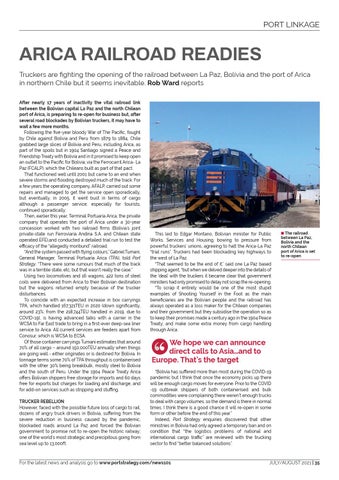PORT LINKAGE
ARICA RAILROAD READIES Truckers are fighting the opening of the railroad between La Paz, Bolivia and the port of Arica in northern Chile but it seems inevitable. Rob Ward reports After nearly 17 years of inactivity the vital railroad link between the Bolivian capital La Paz and the north Chilean port of Arica, is preparing to re-open for business but, after several road blockades by Bolivian truckers, it may have to wait a few more months. Following the five-year bloody War of The Pacific, fought by Chile against Bolivia and Peru from 1879 to 1884, Chile grabbed large slices of Bolivia and Peru, including Arica, as part of the spoils but in 1904 Santiago signed a Peace and Friendship Treaty with Bolivia and in it promised to keep open an outlet to the Pacific for Bolivia, via the Ferrocarril Arica- La Paz (FCALP), which the Chileans built as part of that pact. That functioned well until 2001 but came to an end when severe storms and flooding destroyed much of the track. For a few years the operating company, AFALP, carried out some repairs and managed to get the service open sporadically, but eventually, in 2005, it went bust in terms of cargo although a passenger service, especially for tourists, continued sporadically. Then, earlier this year, Terminal Portuaria Arica, the private company that operates the port of Arica under a 30-year concession worked with two railroad firms (Bolivia’s joint private-state run Ferroviaria Andina S.A. and Chilean state operated EFE),and conducted a detailed trial run to test the efficacy of the “allegedly moribund” railroad. “And the system passed with flying colours,” Gabriel Tumani, General Manager, Terminal Portuaria Arica (TPA), told Port Strategy. “There were some rumours that much of the track was in a terrible state, etc, but that wasn’t really the case.” Using two locomotives and 16 wagons, 422 tons of steel coils were delivered from Arica to their Bolivian destination but the wagons returned empty because of the trucker disturbances. To coincide with an expected increase in box carryings TPA, which handled 167,321TEU in 2020 (down significantly, around 23%, from the 218,744TEU handled in 2019, due to COVID-19), is having advanced talks with a carrier in the WCSA to Far East trade to bring in a first-ever deep-sea liner service to Arica. All current services are feeders apart from Conosur, which is WCSA to ECSA. Of those container carryings Tumani estimates that around 70% of all cargo – around 150,000TEU annually when things are going well - either originates or is destined for Bolivia. In tonnage terms some 70% of TPA throughput is containerised with the other 30% being breakbulk, mostly steel to Bolivia and the south of Peru. Under the 1904 Peace Treaty Arica offers Bolivian shippers free storage for imports and 60 days free for exports but charges for loading and discharge, and for add-on services such as stripping and stuffing. TRUCKER REBELLION However, faced with the possible future loss of cargo to rail, dozens of angry truck drivers in Bolivia, suffering from the severe reduction in business caused by the pandemic, blockaded roads around La Paz and forced the Bolivian government to promise not to re-open the historic railway; one of the world’s most strategic and precipitous going from sea level up to 13,000ft.
This led to Edgar Montano, Bolivian minister for Public Works, Services and Housing, bowing to pressure from powerful truckers’ unions, agreeing to halt the Arica-La Paz “trial runs”. Truckers had been blockading key highways to the west of La Paz. “That seemed to be the end of it,” said one La Paz based shipping agent, “but when we delved deeper into the details of the ‘deal’ with the truckers it became clear that government ministers had only promised to delay not scrap the re-opening. “To scrap it entirely would be one of the most stupid examples of Shooting Yourself in the Foot as the main beneficiaries are the Bolivian people and the railroad has always operated as a loss maker for the Chilean companies and their government but they subsidise the operation so as to keep their promises made a century ago in the 1904 Peace Treaty; and make some extra money from cargo handling through Arica.
8 The railroad between La Paz, Bolivia and the north Chilean port of Arica is set to re-open
‘‘
We hope we can announce direct calls to Asia…and to Europe. That’s the target “Bolivia has suffered more than most during the COVID-19 pandemic but I think that once the economy picks up there will be enough cargo moves for everyone. Prior to the COVID -19 outbreak shippers of both containerised and bulk commodities were complaining there weren’t enough trucks to deal with cargo volumes, so the demand is there in normal times. I think there is a good chance it will re-open in some form or other before the end of this year.” Indeed, Port Strategy enquiries discovered that other ministries in Bolivia had only agreed a temporary ban and on condition that “the logistics problems of national and international cargo traffic” are reviewed with the trucking sector to find “better balanced solutions”.
For the latest news and analysis go to www.portstrategy.com/news101
JULY/AUGUST 2021 | 35









